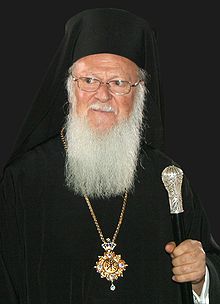Ecumenical Patriarch of Constantinople

The Ecumenical Patriarch of Constantinople ( Greek Οικουμενικός Πατριάρχης Κωνσταντινουπόλεως ) has a double role within the Orthodox Church : on the one hand, he is the head of the Orthodox Church as the " primitive Christian of Constantinople" , on the other hand he faces the entire Orthodox Church of Constantinople . Its official seat is in Phanar in Istanbul . According to Turkish law, the patriarch must be a Turkish citizen (the only exception after 1923: Athinagoras ; 1948–72). His official title is Archbishop of New Rome Constantinople and Ecumenical Patriarch ( Greek Ἀρχιεπίσκοπος Νέας Ρώμης Κωνσταντινουπόλεως καὶ Οἰκουμενικὸς Πατριάρχης Πατριάρχς Πατριάρχς ςατριάρχς ατρ ).
Bartholomeos I has held the office since 1991 . As with the Pope, the address is "His Holiness".
Head of the Church of Constantinople
The Patriarch is the head of the autocephalous Church of Constantinople . In spiritual matters he also has the right to give instructions within the autonomous Greek monastic republic of Athos .
As the honorary head of all Orthodox Christianity
Just as the Bishop of Rome sees himself as following the Apostle Peter, the Bishop of Constantinople sees himself as following the Apostle Andrew , who is venerated as the first bishop of this city.
Since the Second Ecumenical Council (Constantinople 381) the Ecumenical Patriarch of Constantinople has stood before the Patriarchates of Alexandria , Antioch and Jerusalem , see Pentarchy , and thus holds the first patriarchal chair of Orthodox Christianity. Today there are other patriarchates, see List of Canonical Orthodox Churches
This makes the Ecumenical Patriarch "primus inter pares" among the patriarchs in Orthodox Christianity. This is reflected by the title of ecumenical what here no inter- denominational, but an intra has religious significance. The Ecumenical Patriarch coordinates the cooperation of the Orthodox Churches, it convenes the Pan-Orthodox Conferences and conducts the ecumenical dialogue. Unlike the Pope in the Roman Catholic Church , he has no authority over the other autocephalous churches and does not appoint any bishops there.
The Turkish government only recognizes the patriarch in his capacity as head of Greek Orthodoxy in Turkey, but not as honorary head of Orthodoxy.
Succession
Because of the small number of Orthodox remaining in Turkey, choosing a qualified head of the church is increasingly difficult. To make matters worse, the training of priests is currently prohibited by the state in Turkey. The only remaining Greek Orthodox seminary in Turkey on the Prince Island of Heybelıada ( Greek: Halki ) in the Sea of Marmara was closed by the state in 1971 when Turkey nationalized all private universities. The reason was that the Turkish government demanded a formal connection of the seminary to the religious faculty of the University of Istanbul, but the patriarchate insisted on independence. The Turkish government has repeatedly promised to reopen, but this has not yet been implemented. Priests and theologians are therefore dependent on studying abroad, but they risk losing their Turkish citizenship.
See also
literature
- Samim Akgönül: Le Patriarcat grec orthodoxe: de l'isolement à l'internationalisation de 1923 à nos jours. Institut français d'études anatoliennes / Maisonneuve & Larose, Paris 2004, ISBN 2-7068-1807-7 .
- Lina Murr Nehmé: 1453: Mohamet II impose le Schisme Orthodox. François-Xavier de Guibert, Paris 2003, ISBN 2-86839-816-2 .
- Alban Doudele: Les Orthodoxes grecs. Brepols (coll. Fils d'Abraham), Brussels 1996, ISBN 2-503-50467-1 .
- Jean-Pierre Valognes: Vie et mort des Chrétiens d'Orient. Fayard, Paris 1994, ISBN 2-213-03064-2 .
Web links
- Patriarchy website (English)